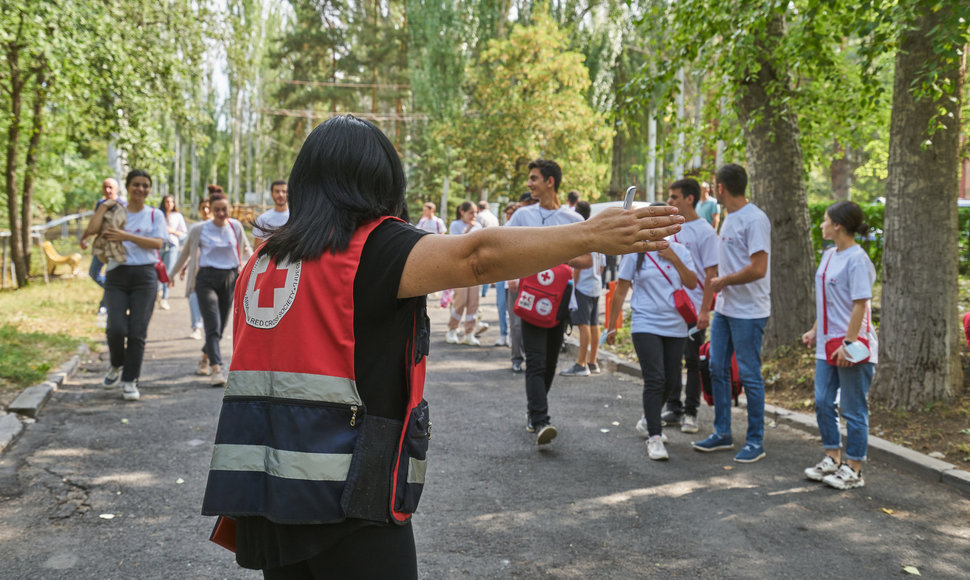From Kaunas to Yerevan
After state borders were closed following Covid-19 lockdowns in most countries back in March 2020, hosting international volunteers became impossible. “We had some online meetings and exchange of experiences during this time, because the Red Cross is a very big community,” says Kalepsi Chgrikyan, Programme Officer for Youth in Yerevan’s office. “But we were happy to have the two Lithuanian volunteers with us on the ground. It was a great cultural experience first of all for them, and for our volunteers too.”
Laura Belickienė, Human Resources Manager at the Lithuanian Red Cross, and professional photographer Vytautė Stankevičienė, who has been volunteering with the Lithuanian Red Cross for two years, travelled to Armenia as expert volunteers. Here, Vytautė reflects on her three-week placement with the Armenian Red Cross.
What motivated you to volunteer in Armenia specifically?
I’m following the activities of Red Cross Societies in other countries and the Armenian Red Cross is a very strong one. It is obvious from the information and images they publish, and their social media. So I was very happy to receive an invitation to visit them for three weeks. I was interested in a different culture, their Red Cross programmes, especially the ones they carry out for migrants/refugees, first aid, and disaster management.
As recently there had been war on the border with Azerbaijan and that area was still considered a conflict zone, I got to know about International Committee of the Red Cross activities there, such as negotiations for captured prisoners, body recognition and transfer, search for the missing people, and others. I wanted to get as much experience as possible so that I could use it in my work with the Lithuanian Red Cross. I think these are actually the best motivators: getting experience, being in a different culture, and coming to know about their great programmes.
What specific things did you do in Armenia and how did they differ from those that you are used to in Lithuania?
I spent most of my time in Armenia with the youth programme called Smiley Club. I observed their activities and had long conversations with volunteers and their team leaders. I regret not having had the time to visit more regional Red Cross branches – apart from the central HQ in Yerevan, I was only in Gyumri.
I noticed that Red Cross activities in Armenia are different from ours. For example, their programme in which volunteers visit lonely elderly people, is very different from our “Warm visits.” In Lithuania each participating volunteer regularly visits one or several senior citizens, while in Armenia every senior receives a group of 5 or 6 volunteers at once, and they spend lots of time talking. In this way they visit quite a good number of elderly people in just one day.
One disadvantage that I felt personally was my short time volunteering with the Red Cross. I’ve been a volunteer since a long time, but with this organisation I’ve only been involved for two years. I felt it on occasions when I was asked a question and could not provide an accurate answer due to my lack of detailed knowledge. But instead, I tried to be creative. As a photographer, I filled that gap with a photography training for Armenian volunteers.
What made a strong impression on you that remained with you after returning?
So many things I observed and explored during my time there! But I think the most important one is about one’s family and extended family. Armenians spend a lot of time with their parents and grandparents. It’s very common for several generations to live together. They have immense respect for the elderly. One woman told me after moving out from her parents’ house because of her work, she was crying every evening for not being able to be with her parents. I advised her to enjoy being independent and doing everything in her own way. She replied: “Our time with our parents on this Earth is so limited, we have to enjoy it and be with them as much as we can”












